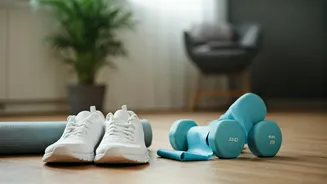The Posture Problem
The way you cradle your phone can have a surprising influence on your state of mind. From slouching over it while sitting to hunching over while walking,
these postures are common and can contribute to heightened anxiety levels. Many people tend to look down at their phones, which often results in a hunched or curved back. This constant downward gaze and compromised posture can send signals of stress and vulnerability to the brain. Similarly, repeatedly holding the phone in specific ways puts pressure on certain muscles. This physical tension can translate into a feeling of mental strain. It is essential to become aware of these postures and how they may be subtly affecting your overall emotional health.
Phone's Mental Toll
The constant need to check notifications, coupled with the allure of social media, has led to what some term as 'phone anxiety.' This stems from feeling compelled to constantly be online, which can lead to feelings of overwhelm and inadequacy. This is further intensified by the physical aspects of phone usage. Think about the repetitive movements of scrolling, the strain on your eyes, and the way your neck and shoulders tighten. All of this contributes to a sense of physical and mental unease. When your body is in a state of tension, your mind often follows suit. This combination can trigger or exacerbate anxious feelings, making it challenging to feel relaxed and present in other areas of life.
Common Phone Postures
Several common phone postures tend to amplify anxiety. The 'head-down' posture, where the neck is craned downwards to look at the screen, is a frequent offender. This not only creates physical strain but also can make one feel less alert. Another posture involves a slumped sitting position, common when lounging on a couch or in bed. This posture restricts the flow of oxygen and can make one feel low. Extended periods of holding the phone in one hand while multitasking can also lead to tension. Be aware of the physical sensations during phone usage, and notice when your posture changes. The goal is to be mindful of how you're holding your phone and to make adjustments. If a posture feels tense, try to correct it immediately.
The Remedy: Mindfulness
Mindfulness plays an important role in mitigating the negative effects of phone usage. Practice by pausing before reaching for your phone. Consider what you hope to achieve by using it. When you do use your phone, take notice of your body. Are you slouching? Are your shoulders tense? Make a point of straightening your back and relaxing your shoulders. It's helpful to set time limits on your phone use. Give yourself breaks and consciously put your phone away when you're not using it. This can help avoid constant notifications and the temptation to keep scrolling. Make a habit of taking breaks during longer phone sessions, and engage in other activities. Consider taking walks, deep breathing exercises, or any physical activity you enjoy, which can act as powerful stress relievers.
Phone Use Hygiene
Besides being aware of your posture and practicing mindfulness, there are other ways to approach your phone usage with a healthier perspective. Regularly assess your relationships with technology. Think about the time spent online and the emotional impact. Make changes as needed. This could involve turning off notifications for non-essential apps or deleting apps you find draining. It is possible to create digital boundaries. Another useful tip is to intentionally engage in activities that do not involve screens. Reading a book, spending time outdoors, or connecting with friends in person are all excellent ways to take a break from your phone.
Tech-Life Balance
The key is finding a balance between enjoying the benefits of technology and protecting your mental well-being. Technology, like your phone, is here to stay. The aim is to use your phone in a way that enhances your life, not depletes it. Make adjustments to how you use your phone so you can fully enjoy it. Evaluate the content you're consuming. Choose sources that promote positivity and inspiration. Avoid content that makes you feel inadequate or anxious. By being intentional about your content consumption, and setting the right habits, you can make your phone a tool for your well-being.




















